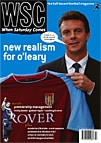 Conservationist Barney Ronay is worried about the squandering of natural resources by clubs such as Arsenal, whose players come in 57 varieties
Conservationist Barney Ronay is worried about the squandering of natural resources by clubs such as Arsenal, whose players come in 57 varieties
When Bill Shankly said, “There are two great teams on Merseyside – Liverpool and Liverpool reserves,” he may well have had little more than Everton-baiting on his mind. However, more than ever, Shankly’s barb reflects a tendency among clubs at the top end of the scale to accumulate alarmingly large first-team squads.
A roll-call of players appearing in Arsenal’s reserves last season reads like a team sheet for an apocryphal village free-for-all – sheep’s heads for goalposts – of the Middle Ages. Thirty-eight potential A-listers have turned out for the Gunners’ second string, among them talents as diverse as Olafur-Ingi Skulason, Nicky Nicolau, and the mysterious defensive monosyllable Juan (squad number: 57). In all, the Gunners currently boast 30 first-team players and 26 young professionals, while last season the first-team bench played host to 34 different names, of which 13 failed to start a single league game.
With even Premiership clubs anxiously awaiting the bailiffs’ knock, the variations in size between the playing staff of clubs at the top and those further down have never been so great. Leicester City saw out the season with 26 professionals on their books, while Nottingham Forest took their promotion bid to the wire with a playing staff of just 22. The reasons for the disparity are simple enough: the bounteous TV income and bloated fixture list generated by the Champions League; the fashion for rotating even first-choice players; and the recent investments in academies and youth programmes by an elite eager to reposition itself towards the credit side of the transfer balance sheet.
But is it healthy? Last year the combined wage bill of Premiership players rose to £720 million. Most top-flight clubs paid out over 70 per cent of their turnover in wages and, despite winning the double and progressing in the Champions League, even Arsenal ended the year £22m in debt. At the same time, the standard of football in the Nationwide First Division appears to have hit a significant low. Of the two automatically promoted teams – Harry Redknapp’s blend of Eurotrash and Premiership old boys, and Micky Adams’ cut-and-paste rescue job at the Walkers Stadium – neither can contemplate top-flight survival with any great confidence.
Further down, Derby, Coventry and Bradford – part of a clutch of recently relegated clubs listing in the lower reaches of the First Division – have spent the last two seasons floundering like galleons holed below the waterline, each downward lurch sending a gangplank of handsomely paid former gravy-trainers tumbling overboard.
Meanwhile, Premiership reserve matches are starting to resemble international friendlies: tentative cameos by recuperative big names, bit-part roles for a jostling roster of understudies, and the odd frenetic audition by a carpetbagging loan player. Where the wisdom of another era dictated that a talented twentysomething ought to be playing first-team football, such is the gulf in earning potential and celebrity cachet between players at top Premiership clubs and those in the lower divisions that youthful second-stringers now seem quite happy to wait for an occasional turn on the bench. Players such as Liverpool’s Richie Partridge and Arsenal’s Jermaine Pennant stood out during loan periods in the First Division last season only to disappear back into the highly paid obscurity of Premiership reservedom, while the only meaningful football Gunners tyro Jerome Thomas played came during a brief spell with QPR.
“He was excellent for us,” says Rangers manager Ian Holloway. “But then he scored a couple of goals and he wanted to go back to Arsenal. The rumours were Real Madrid were watching him. Whether that’s true or not I don’t know. But he thought it was.”
It seems likely that natural wastage is imminent. Bloated first-team squads already look like a hangover from the loadsamoney Nineties and Premiership reserves may soon find themselves victims of a corporate restructuring. Wouldn’t they rather be playing football anyway? The Second Division would certainly be a better place with Thomas turning out for the Rs, rather than cooling his sponsored boots in the fashionable environs of the Arsenal Third XI. And what’s more, you never know who might be watching.
From WSC 197 July 2003. What was happening this month